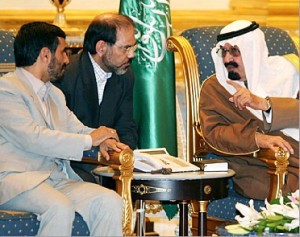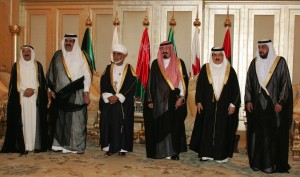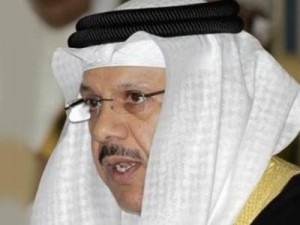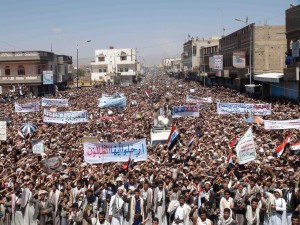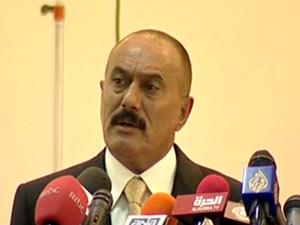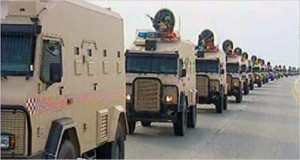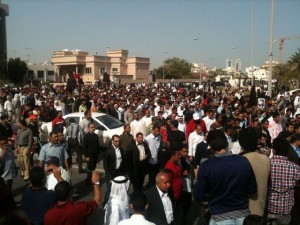The Iranian meddling in Bahrain was temporarily to be put to a hold. However, the prey, albeit small in acreage, is too lucrative to be let go, and Iranian clandestine intervention continues. Bahrain, a small island kingdom in the Gulf, is coveted by Iran, its neighbor across the bay, as it has a lot to covet. Strategically located near the Hormuz straits, through which 20% of the world’s oil passes, with its own production of 40,000 oil barrels a day, and with huge gas reserves, Bahrain is definitely in the sights of the Iranian regime. What makes the Iranian move to indirectly swallow Bahrain a real risk is the fact that 70% of the Bahraini population is Shiite, such as 80% of Iran’s population, and the Bahraini Shiites look up to Iran for guidance, or even instructions.
The Saudi King and other Gulf States rulers read the map correctly and sent troops to protect Bahrain. The demise of the 200-year Bahrain rule of the Sunni dynasty currently headed by King Sheikh Hamad bin Isa Al-Khalifa’s and its replacement by a Shiite puppet of Iran could be ominous to their own regimes. Saudi Arabia is particularly vulnerable because its rich oilfields border with Bahrain and the local population in this region is mostly Shiite. A successful Shiite takeover of Bahrain could whet the appetite of the Saudi Shiites and their Iranian comrades to follow suit. Therefore, with the invitation of the Bahraini king, 3,500 Saudi soldiers crossed the bridge linking Saudi Arabia with Bahrain to help preserve the Bahraini regime.
The Iranians are far from liking this development, which all of a sudden shuffled their cards. Now, it is no longer tiny Bahrain defending itself from Iranian sponsored subversion — it is Iran versus Saudi Arabia and the United Arab Emirates. The bar has risen. Saudi Arabia, with a cash chest that would make King Midas envious and with the backing of the U.S, is a formidable rival to Iran.
The Iranian response to the Saudi move was quick. Local media in the northeastern city of Mashhad reported that 700 people gathered outside the Saudi consulate and stoned it to protest the killing of Shiites in Bahrain. If the Saudi government fails to take the hint, additional protests are likely to follow in other Iranian cities, including Tehran.
Saudi Arabia has increased its pressure on the U.S to intervene and prevent the operation of the Iranian nuclear plant in Bushehr. They quoted Dmitry Rogozin the Russian ambassador to NATO who repeated a previous warning sent by Russia that “The virus attack on a Russian-built nuclear reactor in Iran could have triggered a nuclear disaster on the scale of Chernobyl.” Now the concern is increased following the disaster in the Japanese reactors in Fukoshima. Although Fereydoun Abbasi the head of the Atomic Energy Organization, acknowledged that “Even before the earthquake and nuclear contamination crisis in Japan, Iran had accepted Russian experts’ proposal to revise its plans to load fuel into the core of the Bushehr power plant’s reactor,” Saudi Arabia continues with its pressure against Iran, as part of its effort to limit Iranian clandestine involvement in Bahrain.
The rivalry between Iran and Saudi Arabia is not new. The fervent Shiite Iran and the Sunni Saudi Arabia have long been struggling over the reign of world Muslims. Thus far, with its control of the two holy cities of Mecca and Medina, Saudi Arabia has the upper hand.
The saber rattling continues. Bahrain ousted the Iranian Consul in Manama, and the Iranians retorted in kind. Iran recruited once more Hezbollah, its subcontractor for dirty jobs. During a rally in Beirut, Hezbollah leader Nasrallah criticized Bahrain’s monarchy for bringing in troops from neighboring Saudi Arabia and other Gulf States to quash Shiite protests. Nasrallah said the blood of the people will eventually force their regimes to grant them greater rights.
The Bahraini Foreign Ministry condemned Hezbollah’s criticism of its government, describing it as an intervention in Bahrain’s internal affairs. A statement released by the Bahrain foreign ministry said Nasrallah’s verbal “assault against Bahrain and its people” was aimed at serving foreign interests, a reference to Iran, Hezbollah’s boss. The foreign ministry described Nasrallah as the “representative of a terrorist organization with a known history in destabilizing security in the region.” Apparently, Iran and its allies do not like others to play in what Iran considers its own playground.
Thus far the Iranians are wary not to directly confront the Saudis, and for a reason: For Iran, Saudi Arabia is the last major local power they need to win over; however, it is not a simple task. The Saudis’ big brother is watching — the U.S. The U.S has failed to intervene in Egypt because Egypt is dependent on U.S aid and therefore, it anticipated that the Egyptian response to the U.S lack of active support would be limited to verbal condemnation, if any. However, the terms of reference between the U.S and Saudi Arabia are diametrically different. It is Saudi Arabia that supports the U.S with money, oil and military bases. Therefore, Saudi interests and voices are more likely to be listened to attentively in Washington, D.C.
Nonetheless, the Sunnis in Bahrain have a lot to worry about. The Shiites in Bahrain demand a democratic republic instead of monarchy, and that simple message is certain to find many attentive ears in the U.S and elsewhere. However, democracy in Bahrain with a 70% Shiite majority, means Sunnis out, Shiites in, the U.S and its 5th Fleet harbor out, Iran in, including a control of the oil reserves and a direct threat to Saudi Arabia, the world’s largest producer of oil in fields located next door populated by Shiites.
As absurd as it may sound, it is likely that supporters of full Western style democracy in Bahrain may at the end of the day be supporting theocratic Iran.
A dilemma, Greek for “two premises,” has been likened to the horns at the front end of an angry and charging bull. Both premises are bad options.
If there were ever a decision tantamount to sitting on the horns of the dilemma, the choices the West needs to make are fitting. What would the West choose? Support democracy for approximately 350,000 Shiites in Bahrain, or risk an increased Iranian control of the spigots of the huge oil reserves, with the resulting immediate effect on the world’s economy?
By Haggai Carmon



